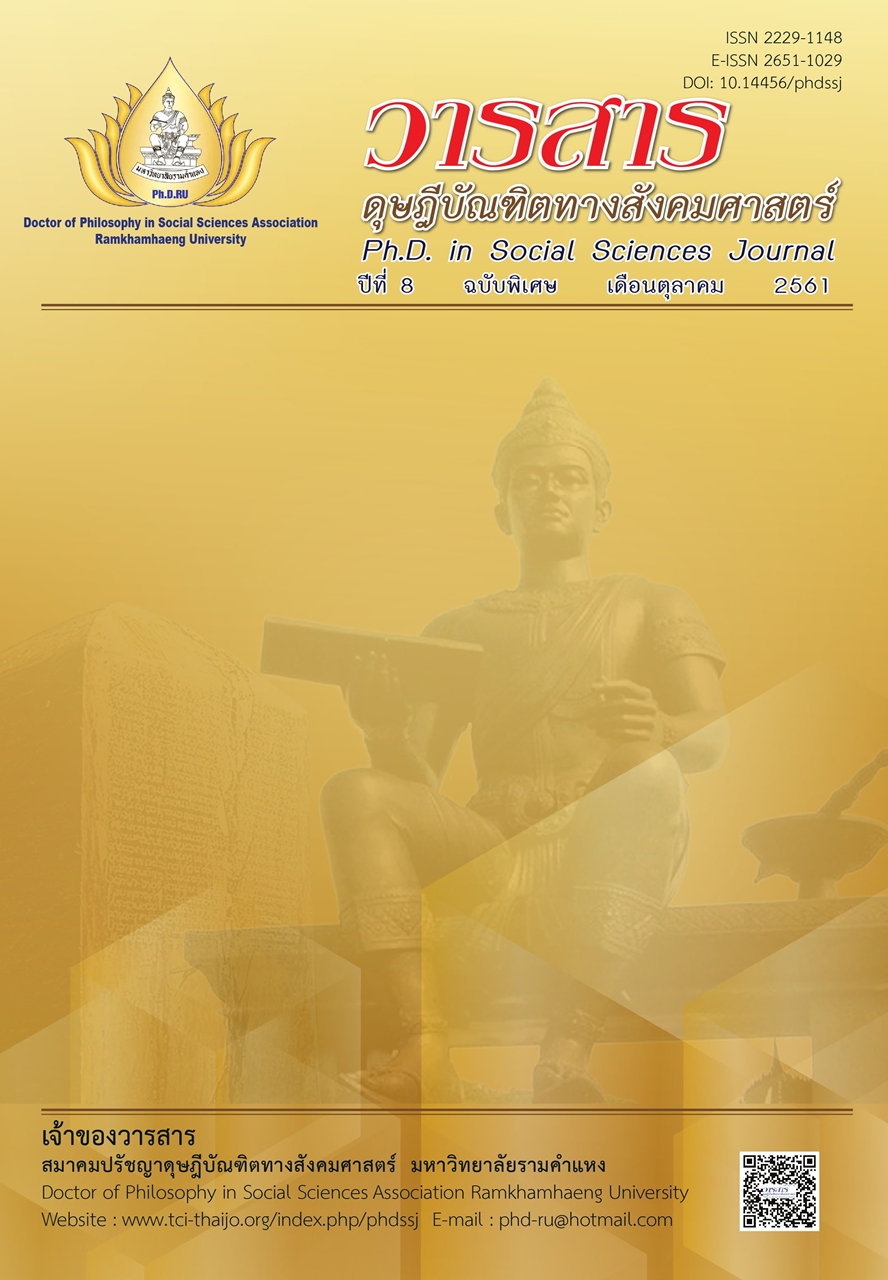A Research Synthesis of Depression in Old Age
Main Article Content
Abstract
This study was research synthesis, objective was to study the research characteristics and impacts of factors which are related to depression in old age. The 65 researches that studied about depression in old age which were published between 2008 - 2017 and could be retrieved on online database and manual search were synthesized. The research instruments were the recording form of research characteristics and research evaluation form. Descriptive statistics were used for data analysis while the effect size was calculated by Cohen’s d formula and correlation coefficient.
Majority of the selected researches were qualified in the Master Degree level and were published in 2013. Most of them were applied research and two major theories were used to apply in the research were biological and psychological theories. Researchers gathered the data using questionnaires that were developed by other researchers. Results showed that the factors which had the most impact in depression of old age were psychiatric history as a personal factor, an ability to perform routine as a biological factor, loneliness as a psychological factor, and type of residence as a sociological factor. The most effective treatment for depression in old age was counseling while the promotional activity to reduce the depression in old age was exercising.
Article Details
Academic articles, research articles, and book reviews in the Ph.D. in Social Sciences Journal are author’s opinions, and not the publisher’s, and is not the responsibility of the Ph.D. in Social Sciences Journal Philosophy Association, Ramkhamhaeng University. (In the case that research is done on human, the researcher has to be trained in Ethics for Doing Research on Human Training and has to produce the evidence of the training).
References
Beck, A.T., Emery, G., & Greenberg, R.L. (1985). Anxiety disorders and phobias: A cognitive perspective. New York: Basic books.
Billing, A. G., & Moos, R.H. (1982). Psychosocial theory and research on depression: An integrative framework and review. Clinical Psychology Review, 2(2), 213-237.
Blazer, D. G. (1993). Depression in late life (2nd ed.). St. Louis, MO: Mosby.
Buranasompop, T. (2004). Effect of empowerment and cognitive restructuring program on depression in abused wives. Master’s thesis nursing, Chulalongkorn University. [In Thai]
Chamornman, U. (1984). Research synthesis: A quantitative approach. Bangkok: Chulalongkorn University Press. [In Thai]
Charoensak, S., Sittironnarit, G., Satra, T., Muangpaisan, W., & Srinontprasert, V. (2018). Prevalence of psychiatric disorders in elderly patients, quality of life patients and caregivers, and their correlated factors. Journal of the Psychiatric Association of Thailand, 63(1), 89-98. [In Thai]
Chaturongsang, N. (1997). The comparisons of self-concept and depression between elderly persons living in and outside home for the aged. Master’s thesis, Mahidol University. [In Thai]
Chunjam, S. (2008). A survey of depression research in Thailand. Master’s thesis, Mahidol University. [In Thai]
Cobb, S. (1976). Social support as a moderator of life stress. Psychosomatic Medicine, 38(5), 300-314.
Cohen, J. (1988). Statistical power analysis for the behavioral sciences (2nd ed.) Hillsdale, NJ: Lawrence Erlbaum Associates.
Corrado, P., & Gottlieb, H. (1999). The effect of biofeedback and relaxation training on depression in chronic pain patients. American Journal of Pain Management, 9(1), 18-21.
Greenglass, E., Fiksenbaum, L., & Eaton, J. (2006). The relationship between coping, social support, functional disability and depression in the elderly, anxiety, stress, & coping. An international Journal, 19(1), 15-31.
Jantarapat, C. (2000). The relationship between selected factors and depression of hospitalized elderly. Master’s thesis, Prince of Songkla University. [In Thai]
Kongsuk, T., & Others. (2014). Guidebook of depression disorders surveillance and care: Province level (3rd ed.). Nonthaburi: Department of Mental Health. [In Thai]
Miller,J.F. (2000). Coping with chronic illness: Overcoming powerlessness (3rd ed.). Philadelphia, PA: F. A. David.
Murray, C. J. L., & Lopez, A. D. (1996). The global burden of disease and injury series. Boston: Harvard University Press.
Office of the National Research Council of Thailand. (2007). Textbook of researcher training. Bangkok: Agricultural Co-operative Federation of Thailand. [In Thai]
Phainrungruang, R. (2013). Interpersonal problems and depression of the elderly at the elderly associate in Phitsanulok province. Master’s thesis medicine, Chulalongkorn University. [In Thai]
Prince, M. J., Harwood, R. H., Blizard, R. A., Thomas, A., & Mann, A. H. (1997). Social support deficits, loneliness and life events as risk factor for depression in old age: The Gospel Oak Project VI. Psychological Medicine, 27(2), 323-332.
Puntaraksakul, S. (2003). Effectiveness of Qigong exercise program applying self-efficacy theory in the elderly with depression. Master’s thesis, Burapha University. [In Thai]
Richardson, T. M., Friedman, B., Podgorski, C., Knox, K., Fisher, S., He, H., & Conwell, Y. (2012). Depression and its correlates among older adults accessing aging services. The American Journal of Geriatric Psychiatry, 20(4), 346-354.
Ruangtrakul, S. (2000). Depression and self-suicidal. Bangkok: Siriraj Hospital, Faculty of Medicine. [In Thai]
Ruangtrakul, S. (2010). Textbook of basic psychiatry and mental disorders (2nd ed.) Bangkok: Siriraj Hospital, Faculty of Medicine. [In Thai]
Sowislo, J., & Orth, U. (2013). Does low self-esteem predict depression and anxiety?: A meta-analysis of longitudinal studies. Psychological Bulletin, 139(1), 213-240.
Taveechai, V. (2000). Self-care behaviors and severity of knee osteoarthritis among the elderly. Master’s thesis, Chaing Mai University. [In Thai]
Thompson, B. (2000). A suggested revision to the forthcoming 5th edition of the APA publication manual. Retrieved May 31, 2017, from https://people.cehd.tamu.edu/~bthompson/apaeffec.htm


